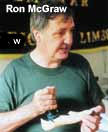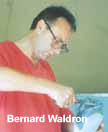
10th September 2000
News/Comment|
Editorial/Opinion| Business| Sports|
Sports Plus| Mirror Magazine

Giving them a leg to stand on
Funded by Lankans in the UK, the Kuruwita workshop for artificial limbs has been a boon to many
By Hiranthi Fernando
Podiappuhamy, a soldier from the Gemunu Watch, lost a leg while in action at Pallai, in April this year. After treatment at the Army Hospital in Colombo, he returned to his regimental headquarters at Kuruwita last week. At the recently open-ed workshop there, Podiappuhamy was measured for a prostheses on Monday. By Wednesday, a limb was fitted and he was able to walk with the aid of a walking stick. The next day saw him walking on level ground unaided.Now, all he needs is the made-to-measure lightweight plastic covering over the sophisticated limb unit he has been fitted with. The limb is controlled by a switch, which can be conveniently reached through the trouser pocket. Podiappuhamy is happy with the limb, which is light, comfortable and easy to handle.
The workshop for the fitting and servicing of artifici-al limbs, set up at Kuruwita is a great blessing to many other amputees like Podiappuhamy. At present, operating on a temporary basis to serve the amputees of Gemunu Watch, there is a suggestion however, to make it a permanent workshop catering to soldiers of other regiments as well. "Ratnapura is a very central place and it would be more convenient for many amputee soldiers to have their artificial limbs repaired and serviced at Kuruwita rather than travelling to Ranaviru Sevana at Ragama, where the only workshop is located," Major Deepal Tennakoon, Adjutant, Regimental Headquarters of the Gemunu Watch said.
The Kuruwita workshop was the result of the commitment and dedication of army officers as well as civilians. It was initiated by Major Tennekoon who was then the Commanding Officer of the RST battalion in charge of the disabled soldiers of the regiment. Major Tennekoon made a request to Lt. Col. Rohan Wijesinghe, a retired army officer who now lives in the UK, for assistance in obtaining equipment for a much needed physiotherapy unit particularly for the disabled soldiers of the regiment. Lt. Col. Wijesinghe arranged the donation of the required equipment through the Meththa Foundation, an organisation of Sri Lankans in Birmingham, UK.
The equipment was delivered by a Sri Lankan doctor working in Birmingham. Thereafter, the doctor, whose speciality was rehabilitation, became deeply involved in helping the disabled soldiers.
"I had access to equipment and knew it was needed here," said the doctor who did not wish to be named. "Ours (the Meththa Foundation) is a small, very informal organisation in Birmingham and we collected money to purchase the physiotherapy equipment. When I first came here to deliver it, Major Tennekoon explained the difficulties the amputees encounter in travelling to Colombo to have their artificial limbs attended to. We spoke to the then Army Commander, Lt. General Srilal Weerasooriya and the Director, Rehabilitation and obtained their approval to set up a temporary workshop at Kuruwita."
The Meththa Foundation collected money for the equipment and the components. About 100 -120 prostheses each costing an average of Rs.150,000 have been donated together with the equipment for completing and fitting the limbs. The workshop is now fully equipped.
"Once a limb is given it needs to be serviced," said the doctor who intends to come on a regular basis during his vacation. "The main workshop will continue at Ranaviru Sevana. We hope to have a mobile unit with teams going out to the different areas to make it easier for soldiers living in remote areas. It is a rewarding experience. I have learned about the amputees. They have a full life ahead. Most of them are employed and married and do not seem to have major physical or psychological problems."
 The
project is fortunate in having the voluntary services of two dedicated
consultant prosthetists from the UK, Ron McGraw and Bernard Waldron, members
of the British Association of Prosthetics and Orthotists.
The
project is fortunate in having the voluntary services of two dedicated
consultant prosthetists from the UK, Ron McGraw and Bernard Waldron, members
of the British Association of Prosthetics and Orthotists.
"An artificial limb is basically a shoe filler, a peg and a hinge," said Ron McGraw who has 30 years experience in the making of legs straight from the metal.
"Technology has to be designed on that basis. The priority is to get the patient comfortable on the socket. Each limb has to be tailor-made to fit the individual stump." Mr. McGraw explained the features in the various types of units, which have been brought down from manufacturers in the UK and Germany. There were units with pneumatic cylinders as well as hydraulic controls. Some even had batteries and a microprocessor, programmed to change the speed of walking. There were flexible ankle units for below the knee amputees with the natural movement of the ankle provided by a ball robot. Units with a fluid knee are provided for above the knee amputees. These units are controlled by a cable released by a socket attached to the thigh, and worked from inside the pocket. Special units were designed with sports people in mind. Made of carbon fibre, they imitated the natural foot.
"A prosthetist has to be a social worker, priest and family member," commented Mr. McGraw.
"He becomes bonded with the amputee. This is therapeutic and helps the amputee to integrate into society and become as near normal as possible."
 In
the workshop, Mr. Bernard Waldron, a consultant prosthetist with 31 years
of experience in making limbs, was busy making the plaster casts. Initially,
a hollow negative cast is fashioned according to the individual measurements
taken. This is set up in a 'jig' and plaster of Paris is poured in to make
a positive mould.
In
the workshop, Mr. Bernard Waldron, a consultant prosthetist with 31 years
of experience in making limbs, was busy making the plaster casts. Initially,
a hollow negative cast is fashioned according to the individual measurements
taken. This is set up in a 'jig' and plaster of Paris is poured in to make
a positive mould.
Adjustments are made on this mould. Next a sheet of polypropylene is placed on a frame and heated in an oven at 225 C. As it softens with the heat, it falls down forming a dome. The semi molten polypropylene is then turned over the positive mould on a vacuum table. The air is vacuumed out and the mould is left to solidify. This fits over the stump, with a soft liner inside the cast. The flexible limb units are fitted inside this cast.
About 80 amputees had been seen until Monday, Mr. McGraw said "All were reassessed. Some only needed adjustments to their limbs. The majority went away happy."
About 10 casts were ready for fitting that day, while 20 amputees were being measured. The doctor and the prosthetists are working round-the-clock in order to assess and provide their services to the amputees who are coming in for treatment. Ariyapala from the Army has been trained for seven months in Birmingham in the making of prostheses. Four others from the Army are being trained by Mr. McGraw and Mr. Waldron, to continue the work.
Mr. McGraw, who has been working with Jaipur Foot says they are also in the process of redesigning a limb using all local components to fit into the Jaipur foot.
With the success of this workshop at Kuruwita, the team working there hopes to establish it as a permanent workshop to function as a branch of the Ranaviru Sevana workshop. They are also trying to raise funds through donations both in Sri Lanka and abroad, to purchase a suitable vehicle and equipment to set up a mobile workshop to service the remote areas. This could also be used by civilian amputees since there will be no security constraints as in an army camp.
Major Tennekoon expressed their gratitude to the many donors who had made it possible for them to set up the workshop as well as a well-equipped physiotherapy unit and gymnasium. Their aim is to do all they can to help the disabled soldiers to integrate into society and lead a near normal life.








![]()
Front Page| News/Comment| Editorial/Opinion| Plus| Business| Sports| Sports Plus| Mirror Magazine
Please send your comments and suggestions on this web site to

